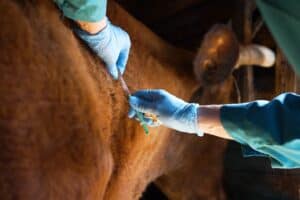“Every outbreak results in the mass culling of birds, leading to meat shortages, rising costs, an industry in financial distress.”

Farmers can apply to the Department of Agriculture for compensation for animals destroyed for a controlled purpose.
This is in terms of Section 19 of the Animal Diseases Act 1984 (Act no. 35 of 84), and Regulation 30 of the Animal Disease Regulations R2026 of 1986 as amended in 2009.
The Act provides for the control of animal diseases and parasites, and measures to promote animal health and related matters.
Solutions for bird flu
Izaak Breitenbach, CEO of the SA Poultry Association’s Broiler Organisation, said there are two methods to deal with avian influenza, also known as bird flu.
The two methods are culling infected flocks or vaccinating birds to build immunity. Though culling is the traditional approach, it is unsustainable, he added.
“Every outbreak results in the mass culling of birds, leading to meat shortages, rising costs, and an industry in financial distress.”
ALSO READ: Poultry industry cannot afford another outbreak of bird flu
Compensation for culled birds
“Unlike other countries, the South African government does not compensate farmers for chickens it orders them to cull.
“That makes culling incredibly expensive for farmers, who can lose their entire flock. Some of them go out of business as a result,” said Breitenbach.
He added that culling works better when it is incentivised.
“When farmers know they will be compensated, that encourages reporting and helps to contain the spread of the disease.
“Without compensation, they may be tempted to hide the outbreak, which can have disastrous consequences.”
Compensation from government
However, Joylene Van Wyk, media liaison officer in the Minister of Agriculture’s office, told The Citizen that an application for compensation can be made to the Director of Animal Health for animals or other things that were destroyed for a controlled purpose.
“The Director of Animal Health will consider each application in accordance with the provisions of the Animal Diseases Act and Regulation 30 of the Animal Disease Regulations R2026 of 1986 as amended in 2009.”
She said they are unaware of a government policy prohibiting compensation, and over the years, the Director of Animal Health has evaluated and decided upon many applications with different outcomes based on their unique and different circumstances.
ALSO READ: Here is why egg prices are high and could increase in future
The only viable solution
Breitenbach said bird flu can no longer be managed by culling alone. They see vaccination as the only viable, long-term solution.
“Vaccination helps protect flocks, reduces the severity of outbreaks, and minimises viral shedding, which slows the spread of the disease.
“While vaccination does not completely prevent infection, it ensures that outbreaks are far less damaging and more manageable, especially from a farmer (and consumer) cost perspective.”
Problem with vaccination in SA
He added that the problem in SA is each poultry producer who wants to vaccinate needs government permission.
However, the government has made the process of accessing vaccines onerous.
“Monitoring and testing requirements are so restrictive and expensive that farmers cannot comply.”
Measures in place by government
When asked what measures are in place to curb bird flu outbreaks, Van Wyk said the department encourages biosecurity on farms as the main means to prevent contact between wild birds and poultry and to prevent lateral spread to other poultry properties.
“This is enshrined in the responsibility of animal owners and managers regarding Section 11 of the Animal Diseases Act.
“Furthermore, Table 2 of the Animal Disease Regulations R2026 of 1986 requires that, in the event of a Highly Pathogenic Avian Influenza (HPAI) outbreak, the responsible person under official supervision destroy all infected and in-contact chickens.
“The department has also implemented a protocol for poultry vaccination under particular conditions designed to prevent the inadvertent spread of the disease by vaccinated animals.”
NOW READ: VAT-free chicken: Sapa applies for no tax on some poultry products in SA
Support Local Journalism
Add The Citizen as a Preferred Source on Google and follow us on Google News to see more of our trusted reporting in Google News and Top Stories.






